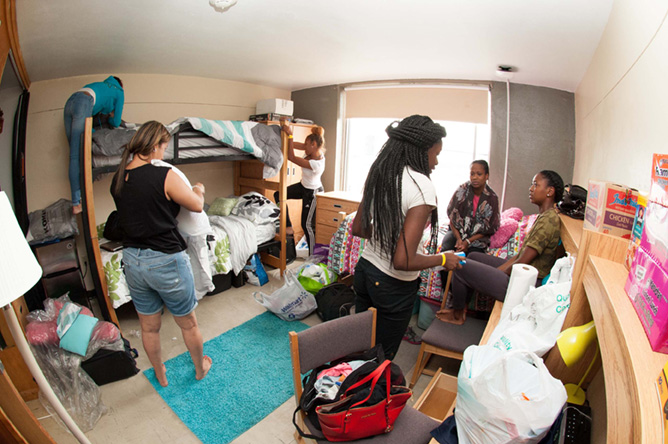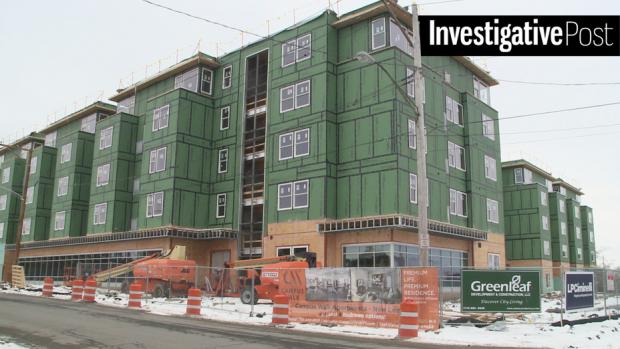Investigative Post: Buffalo State's Sweetheart Deal With Developer
Buffalo State College will prohibit seniors from living on its Elmwood Avenue campus starting this fall to benefit a developer with an unsavory track record of renting to students.
The college and one of its foundations struck a deal with developer Greenleaf Development and Construction that facilitated the building of dorm-style housing adjacent to campus without competitive proposals or independent review by the state comptroller. These are procedures that typically govern SUNY dealings with private businesses.
A Buffalo State official who brokered the deal insisted the college did nothing wrong.
“We would follow SUNY procurement rules if they applied in this situation,”said Michael LeVine, the college’s vice president for finance and management. “We didn’t purchase anything.”
But one good government advocate familiar with state procurement rules said the deal raises “a lot of red flags.”
“This contract needs to be stopped and reviewed by the Comptroller’s Office and probably the state Attorney General should be looking at potential conflicts of interest here and violations of other state laws,” said John Kaehny, executive director of Reinvent Albany.
Regardless of the legality of the deal, emails obtained by Investigative Post under the Freedom of Information Law show Buffalo State officials failed to maintain an arm’s-length relationship Greenleaf CEO Jim Swiezy while negotiating the deal. In fact, during the course of negotiations, LeVine accepted a free set of golf clubs from Swiezy and one of the college’s foundations accepted at least $15,000 in donations from him and his company.
Swiezy refused interview requests for this story. LeVine said the deal was not subject to SUNY rules or a review by the state comptroller because no cash traded hands.
The state comptroller’s office said that state finance law requires a review of any contract that’s valued at more than $25,000. The value of this deal is far above that threshold. Nearly $1 million in real estate changed hands, and an “affiliation agreement” could provide Greenleaf’s Campus Walk One LLC some $800,000 in rents for the first four years.
The affiliation agreement requires the college to market only Greenleaf’s development to students, gives his company prime advertising space on campus, and prohibits seniors from living on campus through the 2021 school year unless Greenleaf’s Campus Walk One development is fully leased.
Meanwhile, the college dismissed working with a competing project less than four blocks away.
Some students aren’t happy with the deal.
“They don’t have the best reputation,” said Terron Grant, president of the Student Government Association, about Greenleaf.

A dorm room. Photo courtesy of the Buffalo State Record.
Housing crunch
Although SUNY Buffalo State’s student population is in decline, the school has still struggled to provide enough housing. Full-time enrollment stands at 8,015 students. Nearly 3,000 reside on campus.
The construction of a 500-bed dorm on campus in 2011 failed to meet the need. As a result, the school paid $2.5 million to neighboring colleges to house several hundred students over the past two years.
Being able to offer housing choices became more of a priority for the college after a survey found that 87 percent of prospective students said the availability of housing was a major factor in choosing a school. That 2012 survey showed the college still needed as many as 350 additional beds to meet the demand for juniors and seniors.
Swiezy seized the opportunity.
Between 2008 and 2014, he and his companies bought more than a dozen properties adjacent to the college in anticipation of using the land for a housing development. At 318 beds, Campus Walk One will fill the lion’s share of the college’s demand for student housing when it opens this on Grant Street fall.
LeVine said Buffalo State originally considered buying the properties from Swiezy and building housing itself, but that plan fell apart.
“The thinking was allow the private developer to come in and put a development near the campus and meet that need with no risks to us,” LeVine said.
Getting to this point took three years of wheeling and dealing.

Buffalo State VP Michael LeVine.
Chummy negotiations
The emails obtained by Investigative Post show how LeVine did not keep an arm’s length relationship with Swiezy.
Swiezy’s first of many meetings with LeVine to discuss the project was on April 22, 2013. The two started meeting two months later with city officials to garner support, including with Mayor Byron Brown and city planners. By 2014, the duo had begun meeting with banks.
“We are considering supporting a student housing project Jim has planned, and would like to determine the level of support required from the campus that would help Greenleaf obtain financing for this project,” LeVine wrote to a commercial real estate lender for First Niagara Financial Group on Sept. 12, 2014.
By 2015, the relationship between LeVine and Swiezy had grown closer, according to emails. They mingled at the college’s annual gala, kept a close watch on a competing project at 100 Forest Avenue, and had private meetings at Starbucks and Pano’s on Elmwood restaurant. Swiezy even playfully described himself to LeVine as “‘your very patient developer” in a March 2015 email.
The affiliation agreement negotiations began to heat up. Emails show that Swiezy pushed the college to require seniors to live in his off-campus development, but LeVine refused.
“The challenge is we need a commitment from you to fill it, before we can move forward,” Swiezy wrote in an email to LeVine on August 27, 2015. “I can’t get financing without it.”
Then, on November 11, 2015, Investigative Post published a story about Greenleaf’s spotty track record as a landlord.
The investigation found that Greenleaf’s rentals had been the subject of more than 100 complaints to the city’s “311” call resolution center. Greenleaf was prosecuted in Housing Court at least 20 times for code violations. Tenants complained that Greenleaf failed to make repairs and withheld security deposit refunds, resulting in more than 70 cases filed in Small Claims Court against either Swiezy or his company.
In addition, Swiezy or his companies ran into tax problems and other legal troubles. At least a dozen contractors filed lawsuits or mechanics liens in an effort to collect more than $300,000 in unpaid bills. City, state and federal officials over the years filed notices to collect more than $400,000 in unpaid property, income and payroll taxes.
It was this report that “made us more aware of some of the history,” LeVine said in a recent interview with Investigative Post. “We understand why he had some of that history. His plans all along were to buy these properties and then demolish them and build something.”
Gifts to official, foundation
The report did little to deter the college from partnering with Swiezy. In fact, the emails between LeVine and Swiezy show that the deal had already been agreed on in principle.
What was initially an offer by Swiezy in 2013 to donate property for the college’s future alumni hall and visitor center morphed into something much more valuable: the affiliation agreement and land-swap deal.
On December 11, 2015, LeVine and Swiezy were preparing their legal teams to complete the reviews of the deal. The question then was whether the product of their negotiations needed independent reviews by the state.
“I will argue, however, that this is not necessary because we are not making financial commitments or receiving revenues as part of the agreement,” LeVine wrote to Swiezy on December 11, 2015. “Not sure if this will fly or not, and if not it could add several months to the process.”
At least one SUNY lawyer would agree with LeVine.
“I don’t think that this has to be reviewed by AG [Attorney General] or OSC [Office of State Comptroller] since there is no procurement and no real State money being spent,” Robert Ruggeri wrote to LeVine on January 27, 2016.
Ruggeri refused to answer questions from Investigative Post.
That same day, BSCR Corp., a Buffalo State foundation, and Greenleaf agreed to swap properties. The college foundation gave Swiezy five properties on Grant, Rees, and Hawley streets with an appraised value of at $600,000; Greenleaf gave the college three properties on Grant and Rees streets appraised at $335,000 and agreed to pay for asbestos removal and demolition of houses on two of these properties.
Two of the four trustees for the foundation were Buffalo State employees, including LeVine.
The affiliation agreement, which required a change to the college’s student housing policy, was approved three months later. It steers students to Greenleaf’s project and prohibits seniors from residing on campus unless Greenleaf’s facility is full. As a result, as many as 240 seniors will be forced off campus through the 2021 school year.
The agreement comes with other perks for Greenleaf.
Buffalo State will market Greenleaf’s complex and agreed to not recommend any competing facilities to students. The college will also provide Greenleaf with contact information of upperclassman who inquire about housing opportunities, allow advertising and marketing of the facility on campus and on the college’s website, and permit company representatives to participate in campus tours with prospective students.
Typically, SUNY schools enter into affiliation agreements with hospitals or other schools for internships or resource sharing. For example, Buffalo State’s chemistry department has an affiliation agreement with the Erie County Department of Health for internships. But the deal with Greenleaf is unchartered territory for Buffalo State.
“We’re doing something very different here,” LeVine said. “I don’t know that this has ever been done through SUNY.”
In general, SUNY procurement rules encourage competitive bidding to safeguard against favoritism, waste, and fraud. The rules require, in general, a minimum of five bids or proposals for contracts worth more than $125,000.
In addition, state law requires the state comptroller review any contract valued at more than $25,000.
“The fact that the state does not pay cash doesn’t automatically mean the contract is not subject to [comptroller] approval,” a spokeswoman for the state comptroller wrote in an email. “An agency has to make a good faith effort to estimate the value of the transaction to determine whether or not such contract needs [comptroller] approval.”
The comptroller did not review the land swap deal or the affiliation agreement, despite the estimated value being well above the threshold.
The college also reaped benefits from its interactions with Swiezy and Greenleaf.
Buffalo State officials refused to disclose the total amount that Swiezy and his company donated since 2013, but emails show Swiezy and Greenleaf gave at least $15,000 to college foundation scholarship programs.
Swiezy also gave LeVine’s golf team a set of golf drivers that he received for sponsoring last year’s foundation Golf and Tennis Scholarship Classic.
LeVine said he never approached Swiezy about scholarship donations. As for the golf clubs, he said he reimbursed Swiezy, but only after Investigative Post filed the Freedom of Information Law request for his emails.
“Looking back on it, it really wasn’t appropriate that we would have accepted any kind of gift,” LeVine said.
Kaehny, of Reinvent Albany, said the deal “on the face of it stinks. It should be investigated by the comptroller and the attorney general.”
Greenleaf given competitive edge
While Swiezy was negotiating with the college, the Planning Board was reviewing a competing proposal.
North Carolina-based Campus Crest wanted to build a 584-bed student housing facility less than four blocks away from the campus, at 100 Forest Avenue, on the site of the former Westwood Squibb facility.
Campus Crest received approval from the Planning Board. But the company didn’t get the same kind of welcome from Buffalo State College.
“I got a note from them late this afternoon telling me they weren’t moving forward, in part because we wouldn’t do an affiliation agreement with them,” LeVine wrote in an email to Swiezy on April 5, 2014.
In 2015, the property was sold to DHD Ventures, another North Carolina-based company.
The emails obtained by Investigative Post show that this project concerned both Swiezy and LeVine.
After LeVine had sent Swiezy a news story about DHD reviving the off-campus student housing project, Swiezy replied on January 2, 2015: “Developers will continue to come forward with alternative proposals until we announce the Grant/Letchworth project.”
The emails show LeVine and Swiezy pressed their attorneys to review the agreements in an effort to finish the project before the competitor completed its project.
“Timing is critical since there is a competing student housing project that could derail our master plan,” Swiezy wrote to his attorney on January 27, 2015.
Both projects will open this fall.
Shannon King, a principal for the company that will manage DHD’s student housing complex, said the college’s “lukewarm” response to the initial project was an obstacle.
“On the surface, it could absolutely put us at a disadvantage,” King said. “I just hope that the university is willing to work with us in the same way that they are with Greenleaf.”
LeVine said the college will not consider a similar agreement with DHD Venture.
“We have no need for that housing,” he said.
Students unhappy
LeVine said the affiliation agreement includes protections for students. For example, any students who live at Greenleaf’s facility will have an opportunity to complete surveys about their experiences.
“We want to know how the students are being treated there,” LeVine said.
In addition, LeVine said a new advisory board will determine rents and housing rules. The number of members has not been determined, but only one college official will be appointed to the board; the rest will be appointed by Swiezy.
In the end, LeVine said location was the most critical element for the college.
“The project will look like it’s part of the campus,” he said.
But Grant, the president of the Student Government Association, said he does not believe the agreement benefits students.
“Students are upset about the fact that once they reach their senior level, they are basically removed off campus,” Grant said. “Whatever happened to senior priority?”
Kaehny said the college missed an opportunity to provide students with the best housing options.
“The students are being used as pawns for the advantage of one developer,” he said.
Dan Telvock is a reporter for Investigative Post, a nonprofit investigative journalism center focused on issues of importance to Buffalo and Western New York.

